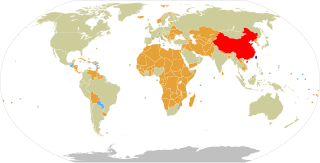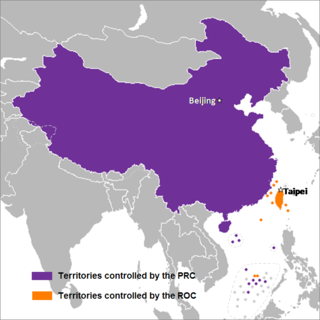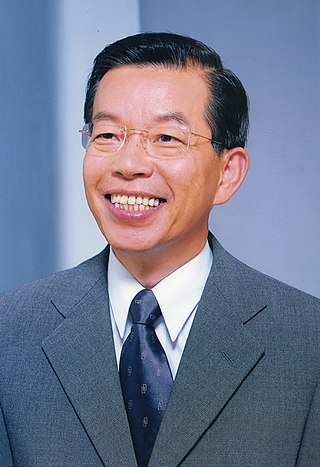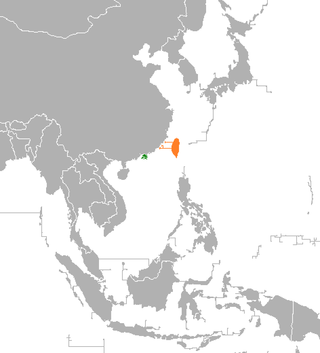Related Research Articles

Foreign relations of the Republic of China (ROC), more commonly known as Taiwan, are accomplished by efforts of the Ministry of Foreign Affairs of the Republic of China, a cabinet-level ministry of the Government of the Republic of China. As of January 2024, the ROC has formal diplomatic relations with 11 of the 193 United Nations member states and with the Holy See, the central governing body of the Catholic Church. In addition to these relations, the ROC also maintains unofficial diplomatic relations with 59 UN member states and one self-declared state via its economic and cultural representative offices. In 2021, the Government of the Republic of China had the 33rd largest diplomatic network in the world with 110 offices.

Chinese unification, also known as Cross-Strait unification or Chinese reunification, is the potential unification of territories currently controlled, or claimed, by the People's Republic of China and the Republic of China ("Taiwan") under one political entity, possibly the formation of a political union between the two republics. Together with full Taiwan independence, unification is one of the main proposals to address questions on the political status of Taiwan, which is a central focus of Cross-Strait relations.
The political status of Taiwan or the Taiwan issue is an ongoing geopolitical dispute about Taiwan, currently controlled by the Republic of China (ROC), that arose in the mid-twentieth century. Originally based in mainland China before and during World War II, the ROC government retreated to Taiwan in 1949 after the Chinese Communist Party (CCP) won the Chinese Civil War and established the People's Republic of China (PRC). Since then, the effective jurisdiction of the ROC has been limited to Taiwan, Penghu, Kinmen, Matsu, and smaller islands.

Ma Ying-jeou is a Taiwanese politician who served as the 6th president of the Republic of China from 2008 to 2016. Previously, he served as the 14th justice minister from 1993 to 1996 and mayor of Taipei from 1998 to 2006. He served as chairman of the Kuomintang (KMT) from 2005 to 2007 and from 2009 to 2014.
The Three Links or Three Linkages was a 1979 proposal from the National People's Congress of the People's Republic of China (PRC) to open up postal, transportation, and trade links between mainland China and Taiwan, with the goal of unifying Mainland China and Taiwan.

Frank Hsieh Chang-ting is a Taiwanese politician and former defense attorney who served as Ambassador of Taiwan to Japan from 2016 to 2024. A cofounder of the Democratic Progressive Party, he has served on the Taipei City Council, the Legislative Yuan, as the mayor of Kaohsiung City, and as the Premier of Taiwan under president Chen Shui-bian. Hsieh was the DPP nominee in the 2008 presidential election and was defeated by Ma Ying-jeou.

The Anti-Secession Law is a law of the People's Republic of China, passed by the 3rd Session of the 10th National People's Congress. It was ratified on March 14, 2005, and went into effect immediately. President Hu Jintao promulgated the law with Presidential Decree No. 34. Although the law, at ten articles, is relatively short, Article 8 formalized the long-standing policy of the PRC to use military means against Taiwan independence in the event peaceful means become otherwise impossible. The law does not explicitly equate "China" with the People's Republic of China.
The 1992 Consensus is a political term referring to the alleged outcome of a meeting in 1992 between the semiofficial representatives of the Chinese Communist Party (CCP)-led People's Republic of China (PRC) in mainland China and the Kuomintang (KMT)-led Republic of China (ROC) on Taiwan. They are often credited as creating a diplomatic basis for semi-official cross-strait exchanges which began in the early 1990s and is a precondition set by the PRC for engaging in cross-strait dialogue.

The 2005 Pan-Blue visits to mainland China were a series of groundbreaking visits by delegations of the Kuomintang (KMT) and their allied Pan-Blue Coalition to mainland China. They were hailed as the highest level of exchange between the Chinese Communist Party and the Kuomintang since Chiang Kai-shek and Mao Zedong met in Chongqing, China on August 28, 1945.
The Three-Noes Policy was a policy established in April 1979 and maintained by President Chiang Ching-kuo of the Republic of China, commonly known as Taiwan, in response to the People's Republic of China's attempts to have direct contact with the ROC. When the United States broke diplomatic ties with the ROC in 1979, the PRC believed that it had complete leverage in convincing the ROC government to talk. President Chiang Ching-kuo refused, reiterating that there were to be "no contact, no negotiation and no compromise" (不接觸,不談判,不妥協) with the Chinese Communists.

Cross-strait relations are the political and economic relations between mainland China and Taiwan across the Taiwan Strait.

A cross-strait charter is a charter flight between Taiwan and mainland China, across the Taiwan Strait. After the Chinese Civil War, no direct flights were allowed between Taiwan and mainland China; this remained the case until 2003. Passengers had to transfer in a third city, such as Hong Kong, to complete their trip.
James C.H. Shen was a Taiwanese diplomat. Shen served as the last official Republic of China ambassador to the United States before the U.S. switched its diplomatic recognition to the People's Republic of China in 1979.
China Circle refers to the economic relationship between mainland China, Hong Kong, and Taiwan. With the fast-growing economy and the development of foreign investment in China, China has become the centre of the Asian market in the 1980s. The production chain in Taiwan and Hong Kong soon merged in China and formed a new economic network named "the Circle of China".

Russia–Taiwan relations or Taiwan–Russia relations are the bilateral foreign relations between Taiwan and Russia. Due to the 2022 Russian invasion of Ukraine, relations became tense after Taiwan imposed sanctions against Russia. Russia placed Taiwan on a list of "unfriendly countries", along with South Korea, Japan, Singapore, the United States, European Union members, NATO members, Canada, Australia, New Zealand, Norway, Switzerland, Micronesia and Ukraine.
A de facto embassy is an office or organisation that serves de facto as an embassy in the absence of normal or official diplomatic relations among countries, usually to represent nations which lack full diplomatic recognition, regions or dependencies of countries, or territories over which sovereignty is disputed. In some cases, diplomatic immunity and extraterritoriality may be granted.

People's Republic of China–Liberia relations refer to the bilateral relations of the People's Republic of China and Liberia. Official relations began in 1977, but were broken on multiple occasions, only to be reformed later on. As of 2009, significant amounts of both investment and foreign aid came from China to Liberia.

China Airlines Flight 334 was a Boeing 747-2R7F/SCD freighter aircraft that was hijacked by pilot Wang Hsi-chueh, a former military U-2 pilot, on May 3, 1986, while en route to Don Mueang, Thailand. Wang had left family members behind in China when he left for Taiwan in 1949 and had met some of them in Hong Kong in 1984. He decided to defect in order to reunite with his family in China. Wang managed to subdue the two other crew members and changed course to land the 747 in Guangzhou, where he defected to the People's Republic of China. The incident forced the Chiang Ching-kuo government in Taiwan to reverse its Three Noes policy in regard to contacting the communist government in mainland China, and Chiang dispatched several delegates to Hong Kong to negotiate with mainland officials for the return of the aircraft and crew. The incident was credited as a catalyst in renewing cross-strait relations between mainland China and Taiwan.
Bonnie S. Glaser is an American foreign policy analyst currently serving as managing director of the Indo-Pacific Program at the German Marshall Fund of the United States. She was previously a senior adviser for Asia and the founding director of the China Power Project at the Center for Strategic and International Studies. Glaser is also a non-resident fellow with the Lowy Institute, a senior associate with CSIS Pacific Forum, and a consultant for the U.S. government on East Asia. Glaser writes extensively on Chinese policy, including its foreign and military policy towards the United States., Cross-Strait relations, China's relations with Japan and Korea, Chinese perspectives on missile defense, and multilateral security in Asia.

Relations between the government of Hong Kong and the Republic of China (Taiwan) encompass both when the Republic of China controlled mainland China, and afterwards, when the Republic of China fled to Taiwan.
References
- ↑ Article Summary of "Interactive Conflict Resolution" by Ronald J. Fisher, BeyondIntractability.org
- ↑ Fmr. ambassador details U.S.-China relations, Brown Daily Herald, Nov. 14, 2005
- ↑ Experts discuss Asia, an Obama presidency, Brown Daily Herald, Nov. 6, 2008